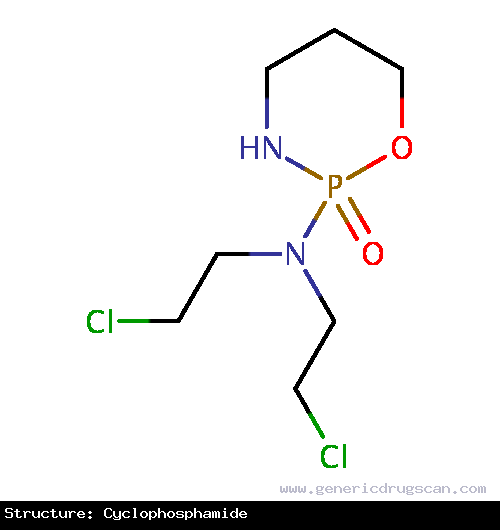Cyclophosphamide Drug: Indication, Dosage, Precaution, Side Effect , Storage, Category Type and corresponding Brands - www.genericdrugscan.com
Cyclophosphamide
Drug Status in USA : ApprovedDrug Status in Canada : Approved
pronunciation
pronounced as (sye kloe foss' fa mide)
Why is this medication prescribed?
Cyclophosphamide is used alone or in combination with other medications to treat Hodgkin's lymphoma (Hodgkin's disease) and non-Hodgkin's lymphoma (types of cancer that begin in a type of white blood cells that normally fights infection); cutaneous T-cell lymphoma (CTCL, a group of cancers of the immune system that first appear as skin rashes); multiple myeloma (a type of cancer of the bone marrow); and certain types of leukemia (cancer of the white blood cells), including chronic lymphocytic leukemia (CLL), chronic myelogenous leukemia (CML), acute myeloid leukemia (AML, ANLL), and acute lymphoblastic leukemia (ALL). It is also used to treat retinoblastoma (cancer in the eye), neuroblastoma (a cancer that begins in nerve cells and occurs mainly in children), ovarian cancer (cancer that begins in the female reproductive organs where eggs are formed), and breast cancer. Cyclophosphamide is also used to treat nephrotic syndrome (a disease that is caused by damage to the kidneys) in children whose disease has not improved, has gotten worse, or has come back after taking other medications or in children who experienced intolerable side effects with other medications. Cyclophosphamide is in a class of medications called alkylating agents. When cyclophosphamide is used to treat cancer, it works by slowing or stopping the growth of cancer cells in your body. When cyclophosphamide is used to treat nephrotic syndrome, it works by suppressing your body's immune system.
How should this medicine be used?
Cyclophosphamide comes as a tablet to take by mouth once a day. The length of treatment depends on the types of drugs you are taking, how well your body responds to them, and the type of cancer or condition you have. Take cyclophosphamide at around the same time every day. Follow the directions on your prescription label carefully, and ask your doctor or pharmacist to explain any part you do not understand. Take cyclophosphamide exactly as directed. Do not take more or less of it or take it more often than prescribed by your doctor.
Your doctor may need to delay your treatment or adjust your dose of cyclophosphamide depending on your response to treatment and any side effects that you experience. Talk to your doctor about how you are feeling during your treatment. Do not stop taking cyclophosphamide without talking to your doctor.
What are the precautions to be followed?
Before taking cyclophosphamide,- tell your doctor and pharmacist if you are allergic to cyclophosphamide, other alkylating agents such as bendamustine (Treanda?), busulfan (Myerlan?, Busulfex?), carmustine (BiCNU?, Gliadel? Wafer), chlorambucil (Leukeran?), ifosfamide (Ifex?), lomustine (CeeNU?), melphalan (Alkeran?), procarbazine (Mutalane?), or temozolomide (Temodar?), any other medications, or any of the ingredients in cyclophosphamide. Ask your pharmacist for a list of the ingredients.
- tell your doctor and pharmacist what other prescription and nonprescription medications, vitamins, nutritional supplements, and herbal products you are taking or plan to take. Be sure to mention any of the following: allopurinol (Zyloprim?), cortisone acetate, doxorubicin (Adriamycin?, Doxil?), hydrocortisone (Cortef?), or phenobarbital (Luminal? Sodium). Your doctor may need to change the doses of your medications or monitor you carefully for side effects. Many other medications may also interact with cyclophosphamide, so be sure to tell your doctor about all the medications you are taking, even those that do not appear on this list.
- tell your doctor if you have previously received treatment with other chemotherapy medications or if you have had x-rays recently. Also tell your doctor if you have or have ever had kidney or liver disease.
- you should know that cyclophosphamide may interfere with the normal menstrual cycle (period) in women and may stop sperm production in men. Cyclophosphamide may cause permanent infertility (difficulty becoming pregnant); however, you should not assume that you cannot get pregnant or that you cannot get someone else pregnant. Women who are pregnant or breast-feeding should tell their doctors before they begin taking this drug. You should not plan to have children while receiving chemotherapy or for a while after treatments. (Talk to your doctor for further details.) Use a reliable method of birth control to prevent pregnancy. Cyclophosphamide may harm the fetus.
- if you are having surgery, including dental surgery, tell the doctor or dentist that you are taking cyclophosphamide.
What are possible side effects of this medication ?
Cyclophosphamide may cause side effects. Tell your doctor if any of these symptoms are severe or do not go away:- nausea
- vomiting
- loss of appetite or weight
- abdominal pain
- diarrhea
- hair loss
- sores on the mouth or tongue
- changes in skin color
- changes in color or growth of finger or toe nails
- sore throat, fever, chills, or other signs of infection
- poor or slow wound healing
- unusual bruising or bleeding
- black, tarry stools
- painful urination or red urine
- rash
- hives
- itching
- difficulty breathing or swallowing
- shortness of breath
- cough
- swelling in the legs, ankles, or feet
- chest pain
- yellowing of the skin or eyes
Cyclophosphamide may increase the risk that you will develop other cancers. Talk to your doctor about the risks of taking cyclophosphamide.
Cyclophosphamide may cause other side effects. Call your doctor if you have any unusual problems while taking this medication.
How to store the medication and dispose it of after its use later?
Keep this medication in the container it came in, tightly closed, and out of reach of children. Store it at room temperature and away from excess heat and moisture (not in the bathroom). Throw away any medication that is outdated or no longer needed. Talk to your pharmacist about the proper disposal of your medication.
Drug Category/Class
- Antirheumatic Agents
- Mutagens
- Myeloablative Agonists
- CYP2D6 Inducers
- CYP2D6 Inducers (strong)
- Combined Inhibitors of CYP3A4 and P-glycoprotein
- Antineoplastic Agents
- Immunosuppressive Agents
- Antineoplastic Agents, Alkylating
- Alkylating Agents
- Antineoplastic and Immunomodulating Agents
- Nitrogen Mustard Analogues
- Cytochrome P-450 CYP2C9 Inhibitors
- Cytochrome P-450 CYP2C8 Inh
| Prescribed | Cyclophosphamide is indicated for the treatment of malignant lymphomas, multiple myeloma, leukemias, mycosis fungoides (advanced disease), neurobla... |
| Weight : | 261.086 |
| Structure | Cyclophosphamide |
 | |
| Formula | C7H15Cl2N2O2P |
Cyclophosphamide has 62 Brands listed
Search Generic Drugs alphabetically
